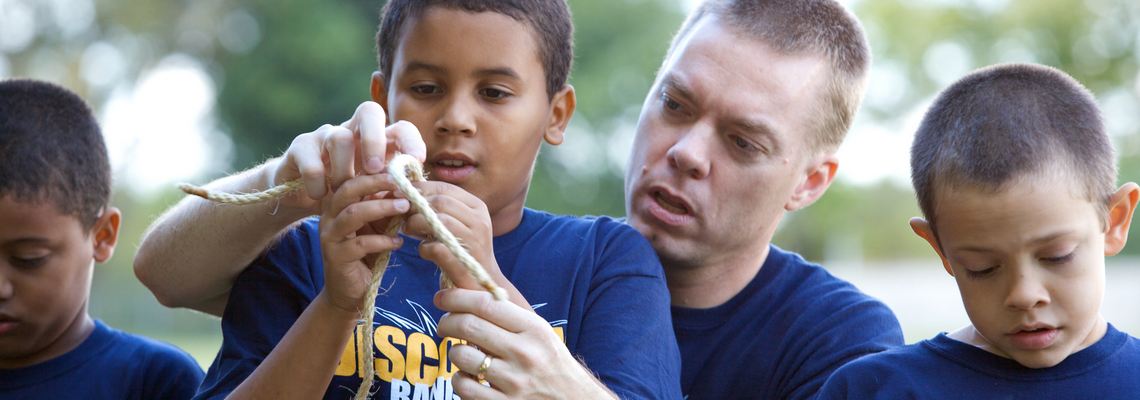Making Merits Interactive

November 6, 2019
Since its inception in 1962, the Royal Rangers program has been an activity-based, action-oriented program. Our aim, as stated in the original 1962 edition of the Royal Rangers Leader Manual, is "to instruct, challenge, and inspire our boys in the areas of Bible doctrine, Christian service, moral conduct, and basic beliefs of our church through the means of interesting activities the boys enjoy." Our goals, as stated in that same manual were:
- To instruct in Bible doctrine
- To challenge for Christian service
- To inspire belief in the fundamental beliefs of our church
- To satisfy the boy's basic need for activity
It has long been understood that boys need activity and learn best in an environment rich with hands-on activities and student participation. It is, therefore, essential that the weekly Royal Rangers meeting be a place where boys are given the opportunity to learn by interactive means and to be directly involved in a variety of physical activities. Lecture sessions with PowerPoint presentations where the boys' primary means of participation is limited to sitting, listening, and writing should be avoided. In order to maximize our effectiveness, it is essential that we utilize methods of instruction that are most effective for teaching boys.
A central part of most Royal Rangers meetings is the program feature where boys learn new skills and satisfy requirements for advancement awards. While the requirements for each award are the same for every boy and not subject to change, the outpost leader has a significant degree of flexibility in the way requirements may be satisfied. With this in mind, consider the following as suggestions when leading your next weekly meeting:
- Whenever possible, complete merit requirements orally as a group rather than in written format. Requirements beginning with words like "explain," "list," or "tell" do not need to be completed in written format but may be completed as a group discussion. Every boy present may then receive credit for having completed that requirement.
- Allow boys to complete essay requirements orally, by making short individual presentations to the group. This will satisfy the purpose of the requirement (i.e., knowledge of the subject) while avoiding a written format that could be a major obstacle for younger boys. For those who aren't comfortable with oral presentations or when the size of the group makes this option unsuitable, allow the boys to create illustrated reports by researching and assembling collages of photos or images with captions describing the subjects. Outpost leaders are empowered to determine when the requirements for a merit have been adequately met.
- Look for ways to get the boys physically involved in the learning process. Requirements that begin with "demonstrate" should always involve physical activity not merely explaining or writing a response. A good standard to follow is to limit "sit and listen" times to approximately 1 minute for every year of the boy's age. For example, a typical 7-year-old Ranger Kid can "sit and listen" for no more than 7 minutes, while a 12-year-old Adventure Ranger may be attentive for about 12 minutes. Look for ways to apply the "hear-see-do-teach" mentoring process of Royal Rangers. Let the boys hear you explain how to do something, see you demonstrate the skill, do or practice the skill themselves, and then assist in teaching others once they've mastered the skill.
- Provide opportunities for the boys to complete requirements as a group or patrol. Interaction with friends makes any task more fun and enhances learning for everyone.
It should be noted that the requirements for the merits cannot be changed and should be completed as written. The handouts associated with each lesson are still valuable resources for learning, and the advancement logbooks in the back of the boy's handbook serve as a valuable resource for tracking the boy's progress through his advancement trail. But the methods used to satisfy each requirement are left to the discretion of the outpost leader who best understands the capabilities of his boys and the types of activities necessary to keep them engaged in the learning process.
As Royal Rangers leaders, we enjoy a tremendous privilege to serve our Master Ranger, Jesus Christ, through the ministry of Royal Rangers. Along with any privilege comes responsibility. It is our responsibility to provide our boys with an "action-packed, life-changing ministry" that will "instruct, challenge, and inspire" them in their personal growth and achievement as they daily grow into the image of Christ.

Royal Rangers USA
